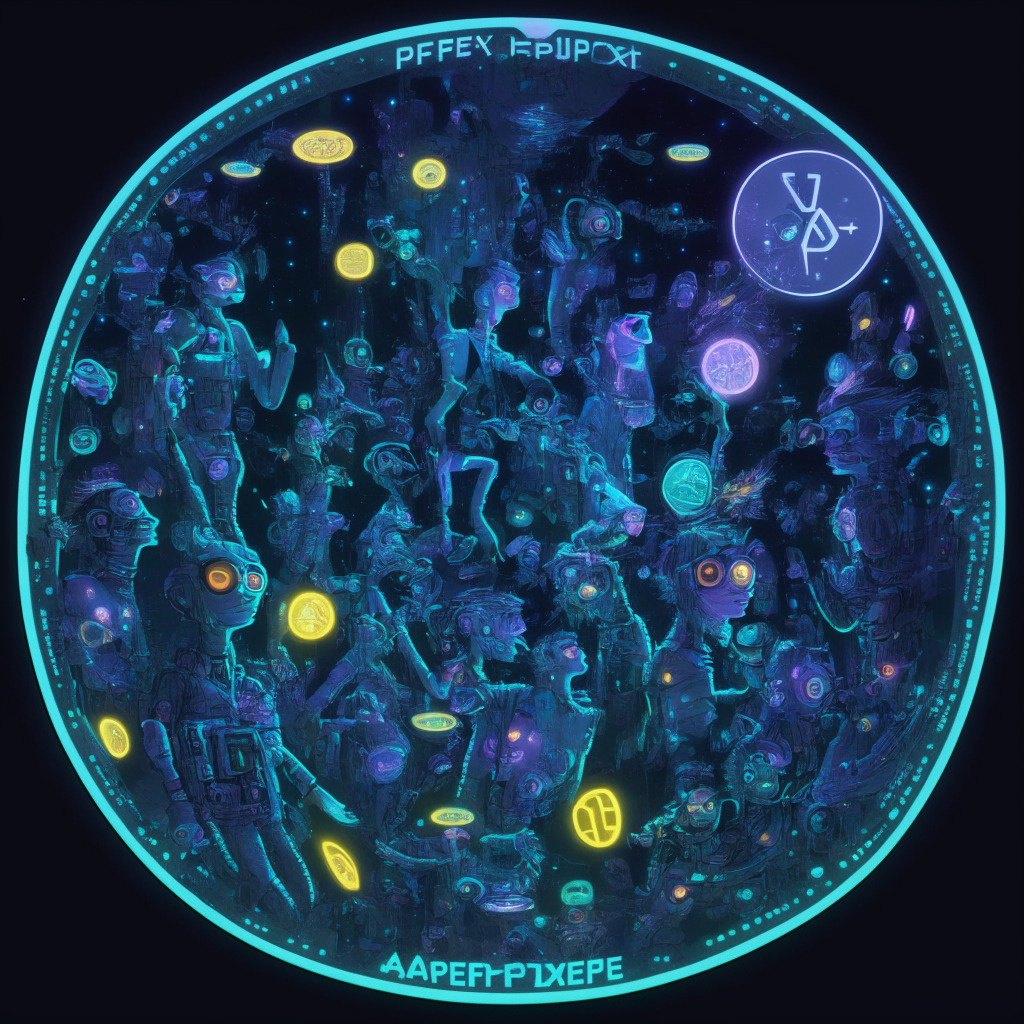yPredict, a rising contender in cryptocurrency and blockchain technology, offers AI-powered analytics solutions via its utility token, YPRED. It’s aiming to integrate AI with cryptocurrency, a blossoming sector, and provide tools like AI-assisted content generation and trading signals. However, its challenge to secure a substantial market share in a crowded space remains.
Search Results for: artificial intelligence
Shaping AI Future: Samsung, Tenstorrent Alliance, and the Global Politics Surrounding AI Chips
Samsung partners with Canadian startup Tenstorrent to develop AI chips, using advanced Samsung manufacturing processes. This innovation, fuelled by a successful funding round, has the potential to create high-performance computing solutions for global customers. However, challenges remain in a fluctuating AI chip market and evolving geopolitical dynamics.
Balancing Act: AI Deep Fakes, Celebrity Scams, and the Quest for Ethical Technology
“The growing trend of AI deep fakes, utilizing celebrities’ likeness without consent for scams or promotions, highlights the urgent need for regulations to balance AI evolution and public safety. However, it’s complicated to manage AI’s creative potential while respecting individual rights.”
Navigating the Future of Payments: Visa’s $100M AI Venture & Crypto Integration
“Visa plans to invest $100 million in generative AI ventures, a technology that can generate various content forms and add dynamism to the industry. The firm’s AI-based solutions have been effective in fraud prevention, highlighting AI’s critical role in enhancing payment systems. However, successful AI implementation requires a robust regulatory framework.”
AI Revolution in Finance: Unparalleled Efficiency or a Trojan Horse?
Jamie Dimon, CEO of JPMorgan, highlights the vast potential of AI in streamlining banking processes including trading, hedging and research. However, he also acknowledges potential risks, such as job displacement and misuse of AI, particularly in cybercrime.
Zuckerberg’s Bet on AI for Meta’s Metaverse Dominance: Visionary Leap or Blind Hope?
Meta’s CEO, Mark Zuckerberg, highlighted the crucial role of AI in the development of the metaverse during a recent interview. By leveraging technology that integrates VR/AR and AI, Zuckerberg aims to establish Meta’s dominance in the 3D immersive metaverse. Despite financial setbacks, he remains committed to the metaverse vision, betting on Llama 2’s technology integration with Meta AI as their unique competitive edge.
Unleashing AI and Blockchain’s Potential in Gaming: New Dimensions or Risky Bet?
“Ryan Wyatt, former gaming head at Google and YouTube, outlines AI’s role in the gaming industry. While not a replacement for tasks, AI will aid game teams to accomplish more. Wyatt sees blockchain’s potential in game development and its necessity in holding accountability over AI advancement due to its transparent, reliable nature.”
Microsoft’s Nuclear-AI Venture: A Leverage or a Risk? Unpacking Crypto’s Latest Developments
Microsoft is recruiting a program manager for their nuclear technology initiatives, as part of their plan to harness AI and nuclear energy together. This move, while offering efficient energy consumption, brings up concerns due to its controversial and risky nature.
AI Market Saturation: An Ideal Breeding Ground for Innovation or an Overheating Bubble?
“The AI era differs fundamentally from its predecessors, displaying practicality and capacity to enhance multiple industries. Despite high valuations and growth, concern surrounds possible AI market overheating. Contrasting views argue market saturation serves as a birthplace for future innovations, thus ensuring industry advancement.”
Merging Worlds: AI Revolution Hit Crypto Trading with Cogwise’s $COGW Token Launch
“Cogwise, the new player in the crypto landscape, merges cryptocurrency and AI to offer innovative trading tools. With its $COGW token, Cogwise positions itself as a rival to OpenAI, offering services like conversation AI model, Real-Time Trading and Smart Alerts.”
AI and Crypto: Striking the Balance Between Hype and Reality
“AI has greatly impacted the crypto industry, particularly in automated trading through AI-powered bots. However, these bots still lack sophistication in complex trading. AI also helps produce insights from vast crypto data, proving useful in assessing market risks. Despite its potential, AI’s access to off-chain centralized exchanges data is limited, impairing its accuracy.”
CIA’s Shift to AI: Advancements in Investigation or Privacy Concerns Waiting to Unfold?
The Central Intelligence Agency (CIA) plans to utilize a custom-built AI tool to optimize investigative techniques by sifting through public information. Despite enhancing efficiency, this shift to AI technology raises concerns about the source of the AI model, information reliability, and data privacy issues. The development implies a significant change in the public sector’s approach to data interpretation.
AI and Creativity Clash in Hollywood: A Balance between Human Genius and Digital Progression
“The approved deal in the Writer’s Guild of America strike underscores AI can’t write or rewrite literary material, thus cannot affect a writer’s credit. Additionally, upon company consent and adherence to policies, a writer can use AI for writing services.”
Balancing Act: SEC Rules on Crypto and Its Implications on Innovation and Governance
“The U.S. Securities and Exchange Commission (SEC) focuses its powers on the crypto market, signaling the need for check and balances. SEC proposes rules for firms to analyze conflicts of interest while interacting with investors and levels the field between tech advancements and governance. The regulation and compliance could substantially impact the future of crypto world.”
Crypto’s Unseen Battle: Armstrong’s Arrest Versus the Bullish Altcoins Rally
“Cryptocurrency influencer Ben Armstrong’s arrest hit the crypto market, causing a 30% drop in the value of BEN tokens. Despite the turmoil, alternative cryptocurrencies like Frax Share and Meme Kombat show strong growth, while Bitcoin BSC draws in investors with its low transaction fees and fast completion times.”
Investigating OpenAI: Balancing Technological Innovation and European Data Privacy Laws
Poland’s data protection watchdog is investigating OpenAI’s ChatGPT following a complaint accusing the firm of “unlawful, unreliable” data handling. The case surfaces significant matters about personal data protection and OpenAI’s compliance with GDPR, reflecting a broader concern about maintaining a balance between technological innovation and privacy.
Tether’s Undisclosed Investment in Northern Data: A Blockchain Breakthrough or Transparency Crisis?
Tether has made an undisclosed investment in German-based crypto miner, Northern Data Group, potentially involving AI, P2P communications, and data storage solutions. Despite past controversies and questions around its financial management and transparency, this move could signify a turning point for Tether and have significant implications for the blockchain industry.
AstroPepeX: The First AI-Spawned Memecoin Sparks Excitement, Questions, and Concerns
An AI, specifically ChatGPT, crafted a memecoin, “AstroPepeX,” valued at $3.5 million, demonstrating a potential AI-Blockchain collaboration. This development questions overreach of AI, control, regulation, and potential risks in the unpredictable crypto market. This is especially pertinent as AI-generated tokens can impact investors and small-scale developers.
Rewiring the Music Industry: AI’s Emerging Role and Its Controversial Impact
“AI platform Musixy.ai is changing the dynamic in the creative music industries by serving as a streaming platform, label, and marketplace for AI-generated music. The platform aims to provide Grammy eligibility for AI-produced songs and offers a solution for copyright infringement issues. However, the adoption of AI in music is met with legal challenges and industry confusion.”
Balancing Act: Europe’s AI Ambition, Between Technological Advancement and Ethical Governance
President Ursula von der Leyen’s recent State of the Union address spotlighted EU’s resolve in enhancing AI technology. Within this endeavor, she proposed a “new global framework for AI”, comprising of guardrails, governance, and guiding innovation. The initiative aims at promoting responsible AI development and includes a project to expedite European supercomputer access for AI startups. Despite optimism, challenges of balancing rapid technological advancement and ethical considerations loom large.
Ernst & Young’s Hefty $1.4 Billion Investment in AI: Boon or Risk for the Future of Technology?
“EY has invested $1.4 billion in AI technologies, targeting the development and launch of the EY.ai platform to aid organizations in adopting AI. The architecture is rooted in EY’s large language model, and gains extra potential through a partnership with Microsoft. The investment is also geared towards integrating AI into existing EY services.”
Brazil’s AI Regulation Journey: Balancing Technology Growth and Human Rights Protection
“Brazil has initiated a procedure to examine, analyze and possibly amend a proposed bill concerning AI regulation. The Bill No. 2338, aimed at managing the use of AI and safeguarding human rights, is now set to undergo close scrutiny by the Senate Commission over the next 120 days. The goal is striking a balance between upholding human rights and fostering AI technological developments.”
California’s AI Cloning Bill: Safeguarding Rights or Stifling Creative Progress?
Assembly Member Ash Kalra has proposed legislation aimed at safeguarding actors, artists and entertainers against the exploitation of AI clones. The bill seeks informed consent in employment contracts for digital replicates of individuals, highlighting a real threat within the entertainment industry.
Harnessing the Power of AI in Cryptocurrency: A Deep Dive into RNDR, Fetch.ai, and yPredict
“The blending of AI and cryptocurrencies like the Render Token and Fetch.ai projects leverage machine learning and blockchain technology, optimizing efficiency, and creating new opportunities. However, remember investing in crypto carries potential risk of capital loss.”
Unraveling the Impact of Eased AI Regulations: Case of Alibaba’s Tongyi Qianwen & Blockchain Future
“Alibaba announced the launch of its AI system, Tongyi Qianwen, amidst China’s eased AI regulations. The Chinese government now requires all AI technologies to undergo a vetting and certification process. This leads to queries about the effect on the blockchain and cryptocurrency landscape, and potential lessons the US could learn from this context.”
Exploring the Upsurge in VET Trading and the Prospect of Investing in Launchpad XYZ’s LPX Token
“VET is seeing increased trading activity following Coinbase’s announcement of support. Market predictions suggest a shift in trend, though downside risk remains. Meanwhile, investors are exploring opportunities on AI trading platform Launchpad XYZ, whose native token $LPX is attracting investor interest.”
AI’s Controversial Role in Music: The Grammy Drama Around AI-Generated Drake Song
“The CEO of the Recording Academy clarified misconceptions regarding an AI-generated Drake song. Despite the song being written by a human, the vocals were not legally obtained nor approved by the artist or label, disqualifying it for Grammy consideration. This highlights issues around copyright law in the context of AI and the need for regulations to keep pace with technology’s evolution.”
Pantera Capital’s Pivot Toward Asia: Blockchain Investment’s New Frontier Amid US Regulatory Ambiguity
“Pantera Capital is refocusing its investment approach on middle-tier, blockchain-focused entities due to a surge in interest rates, affecting company valuations. This strategic shift comes amidst rising investor interest in AI following the crypto market turbulence. Meanwhile, Asia emerges as a new hub for blockchain ventures, despite legal uncertainties in the US.”
Portrait of Legal Challenges and Tech Advancements in Crypto Space: The FTX Boss and SEC’s AI Integration
Former FTX boss, Sam Bankman-Fried, faced legal complications over his request for temporary release, highlighting challenges in the technological logistics of preparing for trial with limited internet access in prison. Conversely, SEC Chair, Gary Gensler, revealed the agency’s use of AI for financial scrutiny, stirring both excitement and skepticism around potential benefits and concerns such as data privacy and transparency.
From Crypto Anarchy to Strict KYC: Is Privacy in the Blockchain Industry at Risk?
Gracy Chen, MD at crypto exchange Bitget, suggests KYC measures might get stricter with users undergoing ID verification perhaps more than once a year. Incorporating biometrics such as facial recognition, fingerprints, or iris scans, into KYC procedures is also gaining traction. Bitget has made KYC mandatory, reflecting a trend in crypto industry’s commitment to transparency and anti-fraud regulations. Chen also stresses the importance of balancing security and privacy, highlighting the role AI can play in enhancing AML capabilities.
AI Partnerships: Unveiling the U.S.-Vietnam Collaborations-Skeletons or Springboards?
U.S. and Vietnam solidify ties through business partnerships focused on AI technologies, cloud computing and semiconductors. Industry giants like Google, Intel, Microsoft, and Nvidia support this initiative, signaling Vietnam’s shift from economic centralization to a more open approach.
Unpacking AI’s Fortitude: A Deep Dive into its Revolutionizing Impact on Supply Chains and Logistics
“AI’s impact on supply chains has seen companies increasingly leveraging AI for efficiency and to address transportation complexities. AI predictive analytics assists in demand forecasting, optimizing inventory and reducing excess stock. Further, AI aids in real-time quality control and streamlining procurement processes in supply chains, enhancing customer experience and improving transportation management.”































